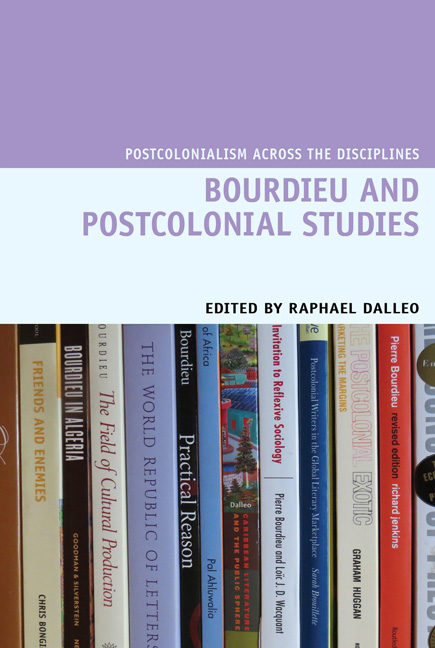Book contents
- Frontmatter
- Contents
- Permissions
- Introduction
- 1 Writing at the Margins: Postcolonialism, Exoticism and the Politics of Cultural Value (from The Postcolonial Exotic)
- 2 Exiles on Main Stream: Valuing the Popularity of Postcolonial Literature (from Friends and Enemies)
- 3 Postcolonial Authorship Revisited (from Postcolonial Writers in the Global Literary Marketplace)
- 4 Bourdieu and Fanon on Algeria
- 5 Style as Habitus: World Literature, Decolonization and Caribbean Voices
- 6 Playing the Game? The Publication of Oswald Mtshali
- 7 Fields in Formation: English Studies and National Literature in South Africa (with a Brazilian Comparison)
- 8 Archived Relationships: Pierre Bourdieu and Writers of the Caribbean Diaspora
- 9 Irony in the Dungeon: Anamnesis and Emancipation
- About the Contributors
- Index
9 - Irony in the Dungeon: Anamnesis and Emancipation
- Frontmatter
- Contents
- Permissions
- Introduction
- 1 Writing at the Margins: Postcolonialism, Exoticism and the Politics of Cultural Value (from The Postcolonial Exotic)
- 2 Exiles on Main Stream: Valuing the Popularity of Postcolonial Literature (from Friends and Enemies)
- 3 Postcolonial Authorship Revisited (from Postcolonial Writers in the Global Literary Marketplace)
- 4 Bourdieu and Fanon on Algeria
- 5 Style as Habitus: World Literature, Decolonization and Caribbean Voices
- 6 Playing the Game? The Publication of Oswald Mtshali
- 7 Fields in Formation: English Studies and National Literature in South Africa (with a Brazilian Comparison)
- 8 Archived Relationships: Pierre Bourdieu and Writers of the Caribbean Diaspora
- 9 Irony in the Dungeon: Anamnesis and Emancipation
- About the Contributors
- Index
Summary
One facet of Pierre Bourdieu's reflexive sociology that makes his work particularly productive and engaging for postcolonial studies is its focus on anamnesis, the critical work of recalling the repressed, historical dimension of a symbolic order taken for granted as natural. What sets Bourdieu's thinking apart from other theorizations of alienation and approaches to demystifying relations of domination, colonial and otherwise, is chiefly the importance it accords to embodiment—to habitus as embodied history, and to practice as a logic inseparable from the material space of social relations that it navigates. In this chapter, I bring Bourdieu's thought to bear on Martiniquan writer Patrick Chamoiseau's Un dimanche au cachot (A Sunday in the Dungeon) (2007). Chamoiseau's novel links the work of anamnesis and emancipation to acts of dwelling together in particular material spaces—namely, a slave plantation converted into foster home—but also to self-ironizing critique, a reflexive technique often perceived as transgressive, and privileged as such in literary criticism.
Examining the relationship in this work between embodied history, ironic affect and reflexive distance, I argue that Bourdieu's particular understanding of practice and reflexive critique brings insight to current debates over postcolonial literature's political commitment and efficacy. More specifically, Bourdieu's analysis of literature—and its capacity to do the work of anamnesis valued by sociologists and postcolonial thinkers alike—provides helpful tools for a postcolonial literary criticism concerned that the field has misplaced its faith by focusing its energies on a fetishized form of literariness marked above all by self-reflexive critique, by a negativity increasingly viewed less as critically edgy or subversive and more often as circular and self-enclosed.
Situating Anamnesis
The importance Bourdieu accords to anamnesis is linked to his deep commitment to the political struggle against symbolic violence, and his strong interest in investigating not only the persistence of social hierarchies, but also processes of historical change and transformation. Bourdieu's reflexive sociology shares with postcolonial literary studies an investment in the struggle for emancipation from violence and, more specifically, an investment in bringing to light the ways in which the exercise of violence, particularly symbolic violence, involves the naturalization of historically produced categories, dispositions and practices. Anamnesis represents the process of recovering that forgotten history, of remembering that what is now taken for granted was not always, and need not remain, self-evident.
- Type
- Chapter
- Information
- Bourdieu and Postcolonial Studies , pp. 191 - 208Publisher: Liverpool University PressPrint publication year: 2016



